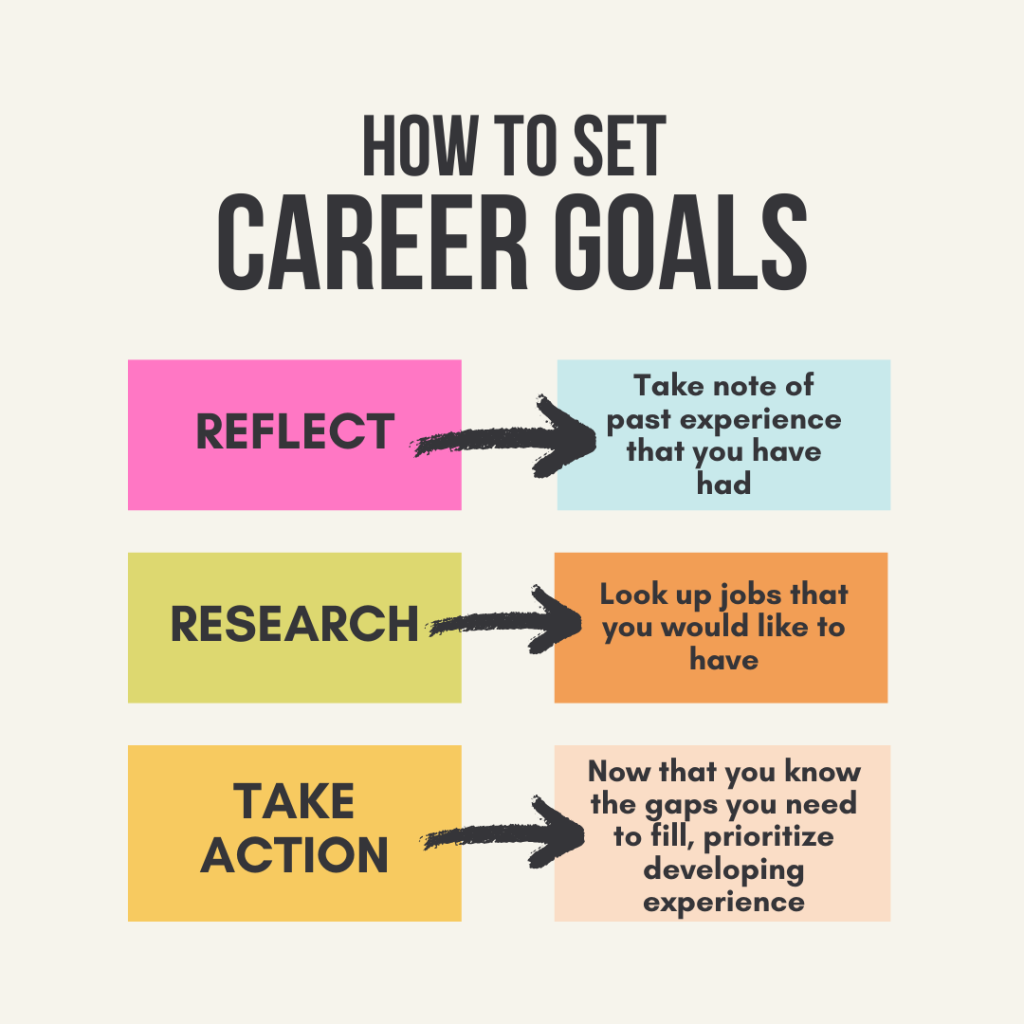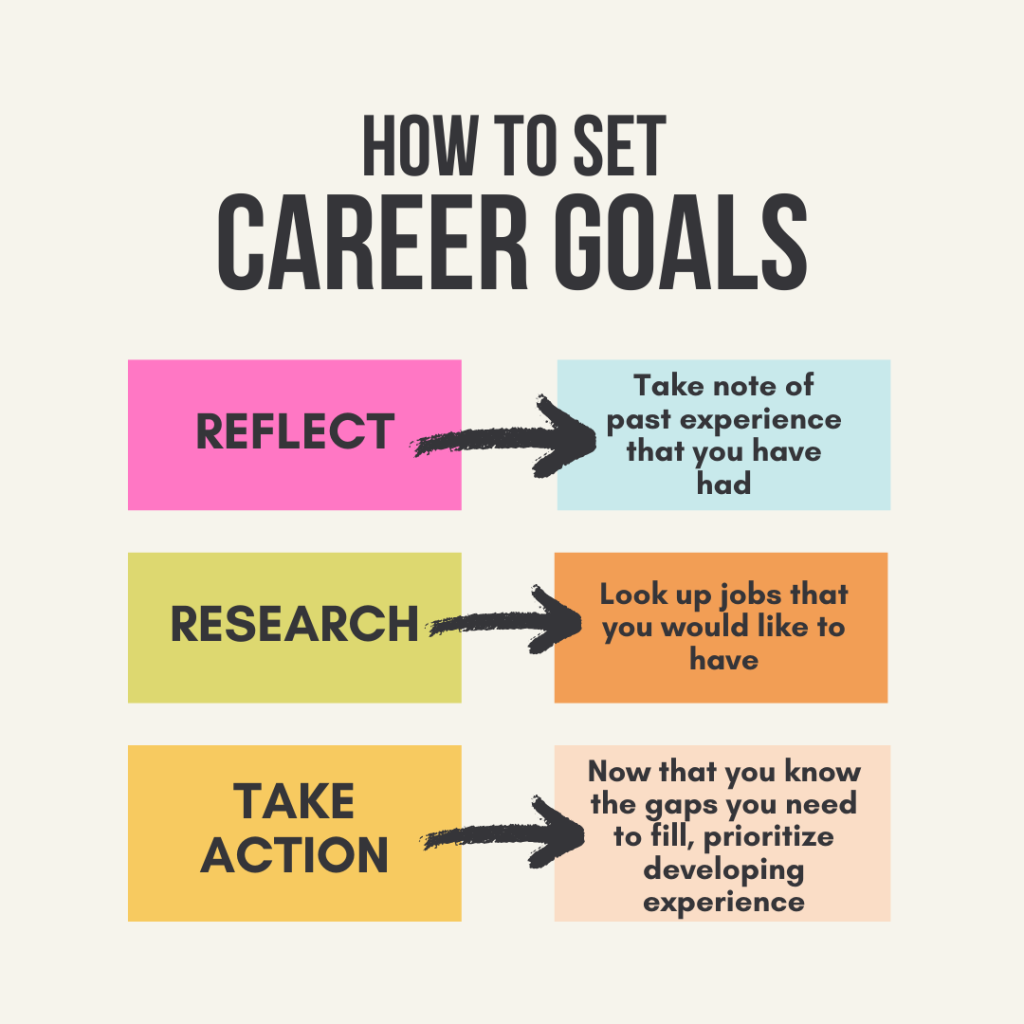Setting Career Goals: A Guide to Achieving Professional Success
In the ever-evolving job market, having clear career goals is essential for staying motivated, focused, and competitive. Whether you’re just starting your career, aiming for a promotion, or considering a career change, setting career goals gives you a roadmap to navigate your professional journey. With a clear plan, you can better track your progress, make informed decisions, and achieve your career aspirations.

Why Setting Career Goals is Crucial
Setting career goals is not just about having aspirations; it’s about creating a framework for your professional development. It allows you to define what success means for you and establishes the steps needed to reach that success. Below are some key reasons why career goal setting is important:
- Direction and Focus: Career goals help you prioritize tasks and focus on what matters most.
- Motivation: Clear goals serve as milestones, motivating you to continue working towards achieving your dreams.
- Accountability: When you set goals, you’re more likely to stay accountable and committed to your personal development.
- Personal Growth: Pursuing goals allows you to learn new skills and gain experience, leading to self-improvement.
Setting goals also allows you to continuously assess your progress, adjust your strategies, and ultimately succeed in your career.
How to Set Effective Career Goals
Setting career goals isn’t just about listing what you want to achieve; it’s about being strategic, realistic, and proactive. Here’s a step-by-step guide to setting goals that will drive you toward your professional success.
1. Identify Your Long-Term Vision
Before setting any goals, take some time to reflect on your long-term career vision. Think about where you want to be in the next 5 to 10 years. Do you want to advance in your current field, switch industries, or start your own business? Having a clear vision will help you set meaningful and aligned goals.
2. Use the SMART Goal Setting Framework
One of the most effective methods to set career goals is by using the SMART system. SMART goals are:
- Specific: Clearly define what you want to achieve. Avoid vague goals like “I want to be successful.” Instead, say “I want to become a manager in my department.”
- Measurable: Make sure your goal is quantifiable. For example, “I want to increase my sales by 20% in the next quarter.”
- Achievable: Set goals that are realistic based on your current skills, experience, and resources.
- Relevant: Ensure that your goals are aligned with your long-term career vision and personal values.
- Time-bound: Set a deadline for your goal. For example, “I want to complete a certification in project management within the next 6 months.”
Using the SMART framework allows you to create actionable steps that are easier to track and accomplish.
:max_bytes(150000):strip_icc()/Balance_Goal_Setting_526182-final-3d5455182eea466cb07afcba96f47927.png)
3. Break Down Your Goals into Smaller Milestones
Large goals can feel overwhelming, but breaking them down into smaller, manageable tasks makes them more achievable. For example, if your goal is to become a manager, smaller milestones might include:
– Completing leadership training
– Leading a team project
– Networking with senior professionals
By breaking down your goals into smaller milestones, you not only make them more attainable but also create a clear path to follow.
4. Set Both Short-Term and Long-Term Goals
While long-term goals are essential for guiding your career direction, short-term goals are equally important for building momentum and maintaining motivation. Short-term goals can be stepping stones to your larger objectives, helping you gain experience and knowledge along the way.
Examples of Short-Term Goals:
- Complete a certification in your field within the next 3 months
- Increase productivity by improving time management
- Attend at least one networking event per month
Examples of Long-Term Goals:
- Become a director or VP of your department in 5 years
- Launch your own business within the next 10 years
- Achieve a leadership role in an international organization

5. Align Goals with Your Personal Values and Interests
When setting career goals, make sure they align with your personal values and interests. It’s important to pursue goals that not only lead to success but also provide fulfillment. If you’re passionate about creativity, for instance, you may want to set a goal to work in a role that allows for creative expression.
Setting goals that are meaningful to you will increase your commitment and satisfaction in your work life. Additionally, alignment between your career and personal values fosters long-term happiness and reduces the likelihood of burnout.
6. Regularly Review and Adjust Your Goals
A career goal-setting process should be dynamic. Life changes, industries evolve, and new opportunities arise. As such, it’s essential to regularly review and adjust your goals. Here are a few tips to keep your goals on track:
- Track progress: Use a journal or digital tool to track your progress and reflect on your achievements.
- Set periodic reviews: Schedule time every 3 to 6 months to review your goals and adjust as necessary.
- Adapt to changes: If you encounter obstacles or discover new interests, don’t be afraid to pivot and adjust your plan.
7. Find Support and Accountability
Achieving career goals is often easier with support and accountability. Surround yourself with mentors, colleagues, or career coaches who can offer guidance, encouragement, and constructive feedback. Additionally, sharing your goals with a trusted friend or colleague can help keep you motivated and on track.
Common Obstacles in Setting Career Goals
Despite the benefits of career goal setting, many professionals encounter obstacles that can hinder their progress. Here are some common challenges and how to overcome them:
1. Lack of Clarity
Sometimes, it’s difficult to define what you want in your career. If you’re unsure about your goals, start by exploring your interests, strengths, and values. Taking career assessments or seeking advice from a mentor can help you gain clarity.
2. Fear of Failure
The fear of failing can paralyze you from even setting goals. To combat this, break down your goals into smaller, achievable tasks, and focus on the progress you’re making. Remember, failure is often a part of the learning process, and it can help you grow.
3. Overwhelming Ambition
Setting overly ambitious goals can lead to burnout or frustration. Ensure your goals are challenging yet achievable. Use the SMART framework to keep your goals realistic and aligned with your current capabilities.
FAQs About Setting Career Goals
1. What’s the best way to track career goal progress?
There are several ways to track your progress:
– Use apps like Trello or Notion to organize and track your goals.
– Keep a physical journal to record milestones and reflections.
– Review your goals at regular intervals (quarterly or semi-annually).
2. Can I change my career goals over time?
Absolutely! As you gain new experiences and insights, your goals may shift. Regularly assess and adjust your career goals to stay aligned with your evolving aspirations.
3. How do I stay motivated when pursuing long-term goals?
To stay motivated, break your long-term goals into smaller, manageable tasks. Celebrate small wins along the way and remind yourself why you’re pursuing these goals in the first place.
4. What should I do if I don’t know what career goals to set?
Start by reflecting on your strengths, interests, and values. You can also seek advice from mentors or career coaches to help you gain clarity and define meaningful career goals.
Conclusion
Setting career goals is one of the most powerful tools you can use to build a successful professional life. By clearly defining what you want to achieve, breaking down your goals into actionable steps, and staying motivated, you can navigate your career with purpose and direction. Remember, setting goals is not a one-time task—it’s an ongoing process of self-reflection, learning, and growth. Whether you’re pursuing a new job, aiming for a promotion, or shifting industries, a well-structured career goal plan will guide you to success.
Start today by applying the SMART framework to your career goals, and watch yourself move closer to the career of your dreams!

